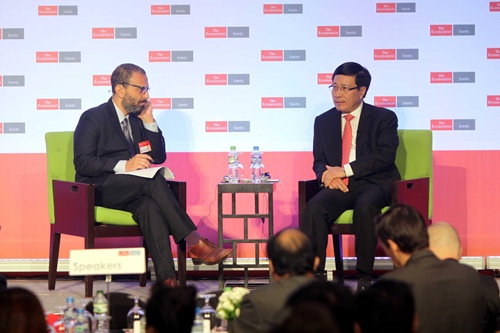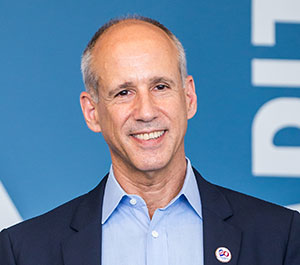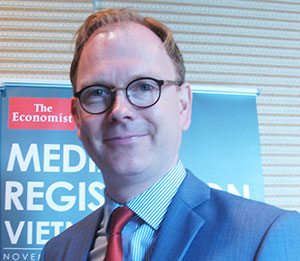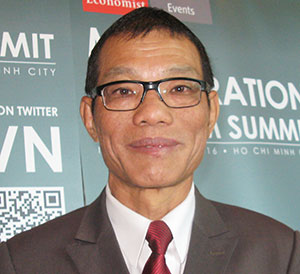Vietnam Summit – Smooth sailing ahead
 |
| Deputy Prime Minister Pham Binh Minh (right) speaks at the two-day Viet Nam Summit 2016 that opened on November 3 in HCM City.-VNS Photo Thanh Vu |
Organised by The Economist and supported by Vietnam Ministry of Foreign Affairs, sponsored by Indochina Capital, RMIT, and many others, Vietnam Summit is participated by country leaders, experts, and economists. It aims to provide in-depth discussions and debate, as well as looking for solutions for Vietnam and the next steps in its development strategy.
According to Deputy Prime Minister cum Foreign Affairs Minister Pham Binh Minh, after 30 years of renovation, Vietnam has maintained its stable growth of six per cent per year due to a constellation of various different reasons.
“One of these is that we [Vietnam] have transitioned from subsidisation to a market economy which wiped out many barriers to growth. Politic utilisation of human resources, proactivity and enthusiasm as well as determination also helped to integrate into the global economy,” Minh said.
Vietnam, Minh stressed, also has an active strategy to equitise State-owned enterprises and is currently receiving the first results. “The government is determined to push along the equitisation process in order to increase these businesses’ efficiency,” Minh said.
 |
According to Jon Fasman, Southeast Asia Bureau Chief of The Economist, Vietnam has been developed in two poles: industrialisation and Foreign Direct Investment.
“Thanks to years of consistent gains, Vietnam has been transformed from one of the world’s poorest countries into a solid middle-income performer,” said Fasman.
“Foreign direct investment is surging, Samsung and Intel are only part of the tide, thanks in part to the government’s record of stable long-term economic planning,” he added.
Vietnam, Fasman added, is exposed to global economic headwinds, but its geography connects it to regional supply chains. Moreover, it is expected to benefit from a number of impending trade deals, including the Trans-Pacific Partnership (TPP).
The Economist Intelligence Unit expects Vietnam’s real GDP to grow by 6.8 per cent in 2016, and even more in 2017.
With a young and reasonably well-educated population, Vietnam is poised to become a hub of innovation in Southeast Asia.
|
In my opinion, the business and investment environment in Vietnam will improve when Vietnam gets into the mainstream of the world through trade agreements, bilateral and multilateral commitments. I think, the more involved in the global stream the better for Vietnam. When joining the global playground, Vietnam gets significant benefits. However, I must emphasise that opportunities always come with risks, but it is important how Vietnam will exploit the advantages that the agreement brings and limit the risks. On the issue of the reform of state-owned enterprises, I think the more equitised the better for the Vietnamese economy. Of course, everything needs time. The Vietnamese government cannot do it overnight, but it needs to implement a strict roadmap to minimize risks. Vietnam is a country with great potential for start-up business and I saw that entrepreneurship enthusiasm is sky-high, especially among the young. I think the Government needs a host more creative policies to encourage start-up businesses, for example, by providing exemption of some taxes or other incentives. |
|
In my opinion, the message the government of Vietnam released this morning is right. These issues were discussed at the National Assembly and have been also deeply implemented across the whole system. The implementation of these messages expresses the government’s deep commitment to the reforms in all sectors from banking and finance to public investment. This will create a good business environment for the development of Vietnam. According to a recent report published by the World Bank, Vietnam has climbed 9 places in the global ranking of business environment in 2017 since last year. These developments leave us in need of faster and more efficient reforms in the near future. Due to restructuring the format of growth, solving non-performing debts, and stabilising the business environment, creating a favour environment for star-up business as well as participating in a series of international trade agreements, I am sure that the business and investment environment in Vietnam will be more attractive. Vietnam has been successful in attracting foreign investment (FDI), however, it still has much more advantages to exploit and the room for growth remains. We can not create a “Tectonic government” if we shy away from reforms. Many other issues also need to be considered, such us approaching financial resources, strengthening human resources, and creating competition for private enterprises, to name but a few. Currently, other countries are also undergoing fast development, so Vietnam cannot stop, we have to move forward, to make an effort to make sure GDP growth reaches 6 per cent this year and even higher levels in the following years. |
|
I think this is one of the basic factors promoting trade and investment activities between the European Community and Vietnam. Lastly, we are very interested in the Government of Vietnam’s new message of “Government Tectonics.” The Government very clearly identified the need for a significant change to promote new ideas and lay down the basis of a better investment climate for the domestic as well as foreign business communities. I hope there will be many more appropriate solutions to build a better investment environment for the business community. To improve the business and investment environment in Vietnam, we at EuroCham made various proposals, such as suggestions to create a more transparent of legal system, administrative procedural reforms, human resources and infrastructure development, not only in terms of transport infrastructure, but also in terms of information technology and reducing production costs. |
| RELATED CONTENTS: | |
| Vietnam bent on renewing itself: PM | |
What the stars mean:
★ Poor ★ ★ Promising ★★★ Good ★★★★ Very good ★★★★★ Exceptional
Latest News
More News
- Foreign leaders extend congratulations to Party General Secretary To Lam (January 25, 2026 | 10:01)
- 14th National Party Congress wraps up with success (January 25, 2026 | 09:49)
- Congratulations from VFF Central Committee's int’l partners to 14th National Party Congress (January 25, 2026 | 09:46)
- 14th Party Central Committee unanimously elects To Lam as General Secretary (January 23, 2026 | 16:22)
- Worldwide congratulations underscore confidence in Vietnam’s 14th Party Congress (January 23, 2026 | 09:02)
- Political parties, organisations, int’l friends send congratulations to 14th National Party Congress (January 22, 2026 | 09:33)
- Press release on second working day of 14th National Party Congress (January 22, 2026 | 09:19)
- 14th National Party Congress: Japanese media highlight Vietnam’s growth targets (January 21, 2026 | 09:46)
- 14th National Party Congress: Driving force for Vietnam to continue renewal, innovation, breakthroughs (January 21, 2026 | 09:42)
- Vietnam remains spiritual support for progressive forces: Colombian party leader (January 21, 2026 | 08:00)

 Peter Ryder, CEO, Indochina Capital Corporation
Peter Ryder, CEO, Indochina Capital Corporation Sebastian Eckardt, lead economist and program leader, World Bank
Sebastian Eckardt, lead economist and program leader, World Bank Vo Quang Hue, vice-chairman, EuroCham Vietnam and managing director, Bosch Vietnam
Vo Quang Hue, vice-chairman, EuroCham Vietnam and managing director, Bosch Vietnam














 Mobile Version
Mobile Version